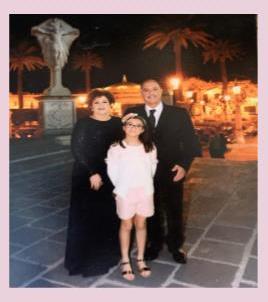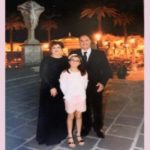 Feeling Safe in the Present through Stories from the Past
Feeling Safe in the Present through Stories from the Past
As John Webb tells it, his southern granny was a talented storyteller who made an important distinction between “telling stories” (“they can get you switched”) and “storytelling” (“they can get you claps”).
Recently Webb’s son Asher, a seventh grade student at Mount Madonna School (MMS), recorded a video interview with his dad, who did some storytelling of his own and recounted his experiences of living through Hurricane Hugo in 1989 when it struck South Carolina, and the enduring changes following that disaster.
Webb’s video interview was part of the StoryCorps History Project created by middle school teacher Chrislaine Miller. All MMS sixth through eighth grade history students participated in the project, which provided an opportunity to build connections and understanding about how individuals – and families – cope with challenges, form and nurture relationships, and persevere during tough times, and relate it to what it is like to deal with the huge life disruption of the current pandemic.
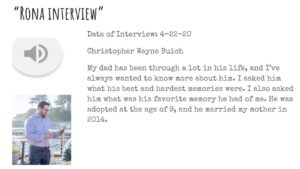 “When I was in college I did an oral interview with my mother,” recalled Miller. “To this day, I treasure it. She passed away a few years back, and even though it’s on a cassette tape, I have her voice.”
“When I was in college I did an oral interview with my mother,” recalled Miller. “To this day, I treasure it. She passed away a few years back, and even though it’s on a cassette tape, I have her voice.”
The StoryCorps organization was founded in 2003 by radio producer David Isay to preserve and share humanity’s stories in order to build connections between people and create a more just and compassionate world. According to the organization’s mission statement, “We do this to remind one another of our shared humanity, to strengthen and build the connections between people, to teach the value of listening, and to weave into the fabric of our culture the understanding that everyone’s story matters.” The popularity of the project has grown tremendously and listeners of National Public Radio (NPR) can regularly hear StoryCorps podcasts on their local NPR stations. To Miller, adapting this idea for a middle school history project seemed especially relevant in the current moment.
“Here we are in the middle of this weird time period of remote learning and shelter-in-place and we have this opportunity to really have a conversation with a parent, sibling or anyone that you are home with,” said Miller.
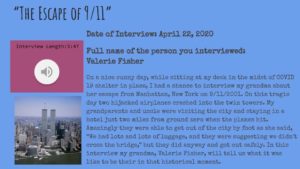 When she introduced the project to her seventh grade medieval world history students, Miller asked the students to consider how distant regions of the world become more interconnected through medieval and early modern times.
When she introduced the project to her seventh grade medieval world history students, Miller asked the students to consider how distant regions of the world become more interconnected through medieval and early modern times.
“If we reflect on this question for a moment during this time away from school, the importance of interconnectedness rings true for us as well,” commented Miller. “During this global pandemic it is important to think about our interconnectedness, especially with the people we are sheltering with right now. As student-historians, each person has the opportunity to write their own histories during this time.”
Miller told her students that their conversations could be about any topic that could elicit some depth and reflection. Students heard this challenge, and the resulting interviews spanned a wide range of topics, including sixth grader Eden Fisher’s learning about a grandparent’s experience in New York City during the terrorist attacks of September 11, 2001; to eighth grader Ethan Lee asking his dad about “his favorite memory of me.” Seventh grade student Destiney Alvarez, alternating between English and Spanish, had a poignant, revealing conversation with her Spanish-speaking grandmother, about her grandma’s difficulties in immigrating to the United States, leaving her former life behind and making her way in a new country. Yet another interview sparked a discussion between a son and father about the father’s childhood experiences.
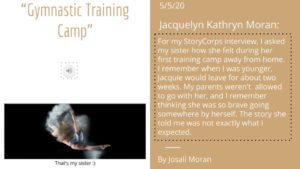 Seventh grader Kinsey Don Carlos interviewed her dad Mike, a commercial airline pilot. She asked him to tell her about the person who had been a huge influence in his life. From their conversation, she learned that her grandfather “was a kind, loving and hardworking man who made her dad and his brother dig holes to plant trees in the early mornings when they were young.”
Seventh grader Kinsey Don Carlos interviewed her dad Mike, a commercial airline pilot. She asked him to tell her about the person who had been a huge influence in his life. From their conversation, she learned that her grandfather “was a kind, loving and hardworking man who made her dad and his brother dig holes to plant trees in the early mornings when they were young.”
One classmate interviewed her older sister, a college student on the East Coast, who is home during the quarantine. The student asked her sister to tell her about her “happiest memories” as a way to “bring back the happy times” and bolster the mood of a sister who is deeply missing her friends and college life.
Above and beyond the content, this was a technically-challenging project for middle school students, according to Miller. Each student recorded a two to five minute interview with a family member and uploaded the audio to a Google Slide presentation that will be shared with their classmates.
Miller acknowledged her own technology learning curve and said she is grateful to MMS Director of Technology Nicole Tervalon for support and help during the project.
 “Outside of my position at MMS I’ve taught online for 10 years,” shared Miller. “For the past five years I’ve taught online summer courses for Santa Clara University. I know how to teach remotely, yet my other experiences have been using different management systems. For remote learning at MMS, I’ve had to learn how to use Google Classroom!”
“Outside of my position at MMS I’ve taught online for 10 years,” shared Miller. “For the past five years I’ve taught online summer courses for Santa Clara University. I know how to teach remotely, yet my other experiences have been using different management systems. For remote learning at MMS, I’ve had to learn how to use Google Classroom!”
“When I started this project, I asked myself, ‘How can I make this a valuable lesson that covers the curriculum and that the students also appreciate, using the tools we have available to us’?”
The outcome, she said, went far beyond her expectations. “These students just don’t know how incredible they are. They are capable of such amazing work. I want to acknowledge and applaud the whole MMS middle school student body for taking this risk, being open, and persevering through the technical challenges.”
Eighth grade student Josali Moran interviewed her older sister Jacquelyn, who is a competitive gymnast.
“I asked my sister how she felt during her first training camp away from home,” shared Moran. “I remember when I was younger, Jacquie would leave for about two weeks. My parents weren’t allowed to go with her, and I remember thinking she was so brave going somewhere by herself. The story she told me was not exactly what I expected.”
“That’s the blessing of StoryCorps and this project,” observed Miller. “You sit down and have these conversations and get to hear these great stories.”
Asher Webb’s interview with his dad about Hurricane Hugo and John’s granny, can be watched on YouTube, see the link below.
“I think that what I learned through working on this project with my dad,” said Webb, “is that we will grow from this [pandemic] and we will survive.”
###
Nestled among the redwoods on 375 acres, Mount Madonna School (MMS) is a community of learners dedicated to creative, intellectual, and ethical growth. MMS supports its students in becoming caring, self-aware, discerning and articulate individuals; and believe a fulfilling life includes personal accomplishments, meaningful relationships and service to society. The CAIS and WASC accredited program emphasizes academic excellence, creative self-expression and positive character development. Located on Summit Road between Gilroy and Watsonville. Founded in 1979.

